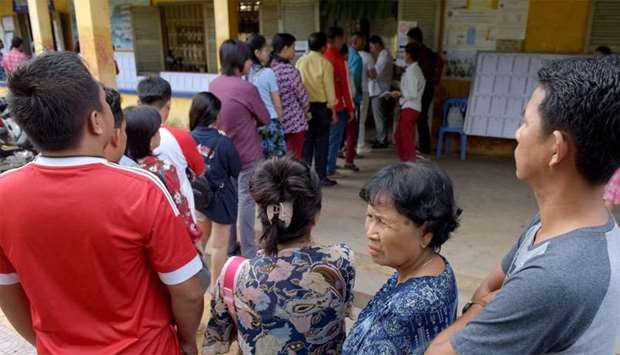Cambodians voted Sunday in an election set to extend strongman premier Hun Sen's 33 years in power after the only credible opposition party was dissolved, effectively turning the country into a one-party state.
Hun Sen, who came to power in 1985 in a country still plagued by civil war, has cracked down on dissent in the run-up to the poll, pressuring civil society, independent media and his political opponents.
The 65-year-old, a one-time defector from the brutal Khmer Rouge regime, has pointed to stability and growth as gifts of his rule -- a message that resonates with his base.
‘Prime Minister Hun Sen is the saviour of the country,’ said voter Sim Chantha. ‘I voted for him and the Cambodian People's Party (CPP).’
Ruling party spokesperson Sok Eysan predicted a landslide victory and said people ‘flocked to vote’.
But there was also despondency and indifference to the predictable poll, with many closely watching the turnout for signs of a snub to the premier.
‘I did not go to vote. I slept at home,’ said Khem Chan Vannak, a former commune chief elected with the now-banned opposition Cambodia National Rescue Party (CNRP).
‘A lot of my friends did not go to vote.’
Western governments have withdrawn their assistance from the election, citing its lack of credibility, with rights groups and the opposition describing it as a knockout blow to the democratic process.
Nineteen small -- or hitherto unknown -- parties are competing against Hun Sen's ruling Cambodian People's Party in the absence of the CNRP.
A National Election Commission spokesperson said preliminary turnout with two hours left was more than 70 percent, just surpassing the final figure in 2013 of roughly 69 percent.
The opposition, whose leaders are in jail, underground or in self-exile, has urged a ‘clean-finger’ boycott as the only safe form of protest.
There were numerous pictures of spoilt ballots on social media on Sunday. An opposition member told AFP they were sent by supporters but they could not be independently verified.
Lines, some with saffron-clad monks, were seen at polling stations early Sunday as voters showed up at schools and pagodas to cast ballots. But they began to thin out by midday.
Hun Sen smiled as he and his wife Bun Rany arrived early to vote just outside the capital, holding up an ink-stained finger for photographers.
The ruling CPP has won every election since 1998.
- 'Fist of a dictator' -
More than eight million voters are registered for the sixth general election since polls organised by the United Nations in 1993.
At the time the country was slowly emerging from decades of war, including the Khmer Rouge years from 1975-79 which killed a quarter of the population.
Hun Sen was installed aged just 32 as national leader during the Vietnamese occupation of 1979-89.
But a youthful population angered by corruption and with little memory of the Khmer Rouge era put the ruling party's longevity in doubt.
Their votes helped the CNRP to secure more than 44 percent of the votes in 2013 and a similar share in local elections last year.
‘The CNRP offered a promise of responsive and non-corrupt governance, and people wanted to give them a chance,’ said Phil Robertson, deputy director of the Asia division of Human Rights Watch.
But Hun Sen snuffed out the looming electoral threat, accusing the rescue party of being involved in a plot to topple the government and arresting leader Kem Sokha.
‘This is a story of how democratic dreams die under the fist of a dictator,’ Robertson added.
The Supreme Court dissolved the party in November 2017, clearing the way for a CPP whitewash on Sunday.
A climate of fear driven by local-level ruling party members has made many reluctant openly to criticise the vote.
- Power and patronage -
Hun Sen has maintained his grip on the country through political and family alliances in the police, military and media.
With control over vast parts of the state, he has placed his sons in key positions in what analysts see as an attempt to create a dynasty.
The United States and the European Union declined to send monitors for the election but Cambodia's ally China provided support.
The CNRP appealed to Cambodians not to vote in the ‘sham election that has no support and is not recognised by the international community’.
Authorities have vowed to take action against anyone who urges a poll boycott even though they insist voting is not compulsory.

